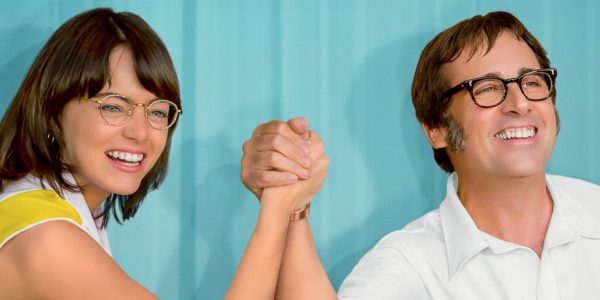Battle of the Sexes Review
The battle for equal rights for women is far from over well into the 20th century, but it’s hard to imagine anything happening today that would make a spectacle of it like the Battle of the Sexes did.
“Battle of the Sexes” recounts the moments that slowly built into the boil that was the 1973 tennis match between women’s No.1 Billie Jean King (Emma Stone) and 55-year-old former champ Bobby Riggs (Steve Carell). Of course by moments, I mean the moments in King’s life. For Riggs, the match was just another showy bet in a serious of outrageous “hustles;” for King, it represented everything she believed in.
Consequently, writer Simon Beaufoy’s narrative does a better job telling King’s story and giving Stone the basis for another great performance (and easily her most off-type character yet). There are always at least two layers to her performance in any scene and we remain constantly in tune with what King is thinking or feeling.
King’s story is not entirely focused on tennis or equal rights, however, which is where things with “Battle of the Sexes” get tricky. There’s a large subplot involving King’s sexual orientation spurred by a romantic encounter with her hairdresser, Marilyn (Andrea Riseborough). Although sexual orientation in the ‘70s is an important issue in its own right, it does not feel critical to the larger story, but rather leveraged for drama. There would admittedly not be much conflict without it, however, it’s handled well, and it’s definitely a piece of who King was and what she was dealing with at the time.
On the other side of the net there’s an effort to depict the way Riggs’ gambling affected his relationships with his wife (Elizabeth Shue) and adult son Lewis Pullman), but that’s the only depth his character has and not much is invested in making it stick. Carell’s directive is to be a goofball. It’s kind of grating and hard to take seriously until you realize that’s actually who Riggs was, and no one can do that better than Carell.
The buildup to their match is slow – the film is halfway over before they even agree to play each other. That said, the balance of the actual drama around this major television event was what it took to get King to agree. King and many fellow women’s tennis players broke off from the USLTA to demand equal pay and Riggs, in addition to his provocative male chauvinist rhetoric, was threatening to dismantle everything they stood for if he could “prove” women were inferior physical athletes.
The sports movie element of “Battle of the Sexes,” specifically the final match scene, hinges completely on feeling a sense of what’s at stake for King and the women’s liberation movement. The scene itself is otherwise a little flat since it was shot from afar, like in actual tennis coverage. This was so you can’t see the fact that Stone and Carell aren’t actually “doing their own stunts” but the scenes could’ve used the extra grit and intensity.
Directors Jonathan Dayton and Valerie Faris (“Little Miss Sunshine”) otherwise make what might’ve been a standard sports movie and comedy a little more artistic. They’re thoughtful about the main shot of a given scene, usually thinking critically about distance between camera and subject. We get some terrific closeups on Stone as well as some wider shots that convey context in meaningful ways.
“Battle of the Sexes” has enough going on and enough good going for it to justify having been made, but perhaps two hours for a film that needed a lot of extra dramatic padding anyway wasn’t the wisest calculation. A thoughtful, mostly well-acted based-on-a-true-story, if there is anything negative to say, it’s only that it looked better on paper.
3.5/5 Stars
Battle of the Sexes
Directed by Jonathan Dayton and Valerie Faris
Written by Simon Beaufoy
Starring: Emma Stone, Steve Carell





0 Comments
You can be the first one to leave a comment.